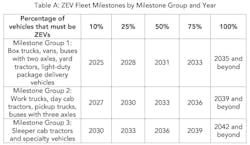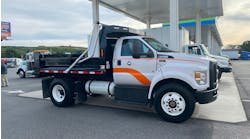NTEA, SEMA sue CARB over Advanced Clean Fleets rule
The NTEA – The Work Truck Association and the Specialty Equipment Market Association (SEMA) filed a lawsuit on Oct. 8 challenging the constitutionality of the California Air Resources Board (CARB) Advanced Clean Fleets rule. The two organizations are seeking immediate declaratory and injunctive relief to stop what they call electric vehicle mandates through the ACF rule. If the ACF were to continue as planned, manufacturers would be required to only produce zero-emission vehicles starting in 2036.
The lawsuit, brought to the U.S. District Court’s Eastern District of California by Sidley Austin LLP on behalf of NTEA and SEMA, argues that the automotive aftermarket industry has "has led the way on alternative-fuel innovations" to reduce emissions in the industry without the ACF.
The ACF Regulations not only "far exceed California’s constitutional and state statutory authority," but "in many ways will undermine—rather than foster—the innovation that historically has generated so many novel ways to drive the development of cleaner, safer automobiles," the suit continued.
The big issue at hand is not all commercial vehicles and trucks are ready to go electric, and fuel cell powertrians and hydrogen fuel are for cost prohibitive.
“Ultimately, work trucks must be available, capable and affordable,” said NTEA President & CEO Steve Carey. “Left unchecked, the current suite of California regulations will severely curtail the ability of work truck users to obtain the vehicles they need to successfully and efficiently carry out their vital missions and support ongoing business operations in critical industries such as public works, utilities and telecommunications, emergency response, construction, food and agriculture, last-mile delivery and many others.”
The Advanced Clean Truck Rule has several main components:
- Manufacturers may only sell zero-emissions medium- and heavy-duty vehicles in California as of 2036.
- As of the end of 2023, drayage trucks in the state must be registered in the Truck Regulation Upload, Compliance, and Reporting System (TRUCRS). Non-zero-emissions “legacy” dryage trucks may operate in the state throughout their minimum useful life. Starting in 2024, only zero-emission drayage trucks may register in TRUCRS, and all dryage trucks entering seaports and intermodal railyards must be zero-emissions by 2035.
- High-priority fleets, which are those that own, operate, or direct at least one vehicle in California and have either $50 million or more in gross annual revenue or who operate, or have common ownership or control of 50 or more vehicles; and federal fleets must submit a compliance report and phase zero-emission vehicles into their California fleets based on two schedules, either by Model Year or by ZEV Milestones. These rules apply to medium- and heavy-duty on-road vehicles with a gross vehicle weight rating greater than 8,500 lbs., off-road yard tractors, and light-duty mail and package delivery vehicles.
- California State and local government fleets must make sure that 50% of their vehicle purchases are ZEVs starting in 2024, and 100% of purchases are ZEVs by 2027.
The NTEA and SEMA are arguing that this rule is unconstitutional for five reasons:
- First, that the rule cannot make regulated persons comply with the rule before it’s been approved by the Environmental Protection Agency, as the EPA’s waiver approval process for California’s regulations has not been completed yet.
- That vehicles purchased and sold outside of California but that operate within the state shouldn’t need to comply with the rule, since they are already subject to the federal Clean Air Act and Federal Aviation Administration Authorization Act, as those rules preempt the ACF.
- That California’s Health and Safety Code (HSC) prohibits the ACF’s rule due to (43018.5(d)(2), which states “The regulations adopted by the state board… shall not require a ban on the sale of any vehicle category in the state, specifically including, but not limited to, sport utility vehicles and light-duty trucks.”
- They also argue that the ACF’s regulations are discriminatory because they place additional regulations on out-of-state companies that are already federally regulated.
- Finally, the NTEA and SEMA stated that several ACF provisions make its requirements “unconstitutionally vague.”
Due to these factors, the NTEA and SEMA are hoping to receive a declaration and injunction to redress injuries and prevent further “unlawful” actions by issuing and enforcing ACF regulations.





